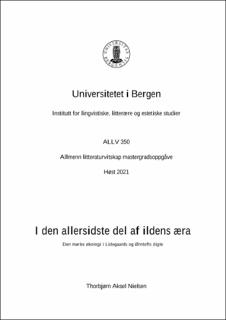I den allersidste del af ildens æra
Master thesis
Permanent lenke
https://hdl.handle.net/11250/2835302Utgivelsesdato
2021-11-22Metadata
Vis full innførselSamlinger
- Master theses [274]
Sammendrag
Denne opgave analyserer Liv Sejrbo Lidegaard og Theis ørntofts respektive poesi med et mørkt økologisk blik. Som udgangspunkt præsenteres derfor noget af den litteratur der allerede eksisterer om dansk økopoesi og økokritik, samt Tue Andersen Nexøs præsentation af den sociale vending fra det forudgående årti. Gennem analysen bliver poesien sat i samtale med Timothy Morton og hans teori om økologi og mørk økologi. Denne analyse viser, at poesien ser den nuværende situation som uholdbar, and at den ser mennesket som en del af verden, ikke skilt fra den eller hævet over den. I stedet viser poesien en verden som er sammenvævet på kryds og tværs, som bedst beskrevet med Mortons mesh-teori. I tillæg vises det at de nuværende reaktioner fra samfundet på klimakrisen ikke er nok mens en anden måde at se mennesket som altid allerede i verdenen på bliver et udgangspunkt for en ny etik og et nyt handlerum. Særligt Lidegaard præsenterer en måde at se samspillet mellem individ og kollektiv på der peger en vej frem, og passer med Mortons teori. Afslutningsvis afviser opgaven dele af den eksisterende litteraturs syn på autonomi, ved at konkludere at denne bølge af økopoesi ikke bryder med kunstens uafhængighed, med i stedet bekræfter den. Dens samfundskritik er i stedet indirekte, selvom den også spejler Peter Sloterdijks beskrivelse af et krav om ændring der udgår fra verdenen selv. This thesis explores the poetry of Liv Sejrbo Lidegaard and Theis Ørntoft and views it through the lens of dark ecology. To this end, it first explores some research already done on Danish ecocritical literature, as well as Tue Andersen Nexø’s presentation of the literature from the decade before, the so-called social turn. Throughout the analysis, the poetry is put in conversation with the theory of Timothy Morton and his view of ecology and dark ecology. It finds that this poetry sees the current climatic situation as non-sustainable, and that it sees the human as a being of the world, not a separated being nor above it. Instead, the poetry presents a world that is totally interconnected, as best described by Morton’s mesh-theory. Additionally, it finds that both current reactions from society are found to be insufficient, and that a new way of viewing the human as being always already in the world would be the basis of a new ethics and new possible actions. Especially Lidegaard presents a way to view the interaction between the collective and the individual that points a way forward, that also fits with Morton’s theory. Finally, it disagrees with some of the existing research and finds that this wave of eco-poetry does in fact not break with the autonomy of the arts, but instead presents its critique of society in a way that affirms its autonomy, though it does reflect Peter Sloterdijk’s call for individual change emanating from the world itself.
